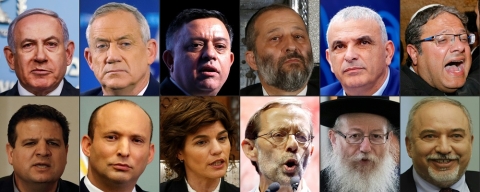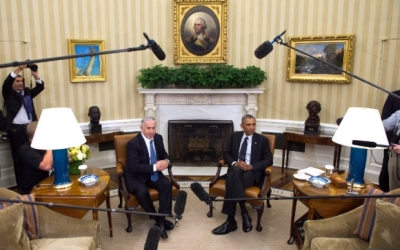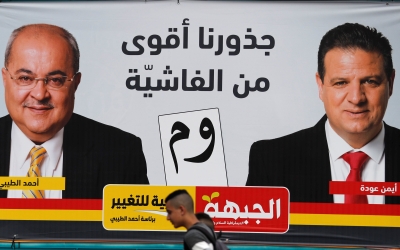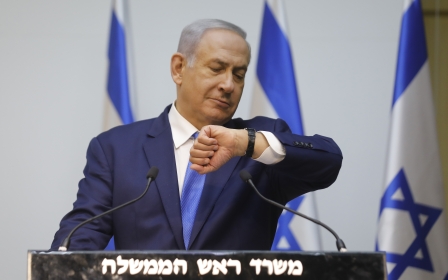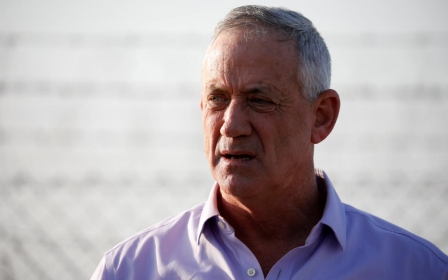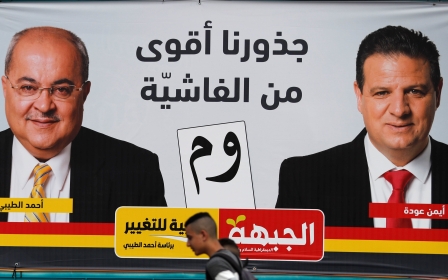Polls open in Israel as PM Netanyahu seeks record fifth term
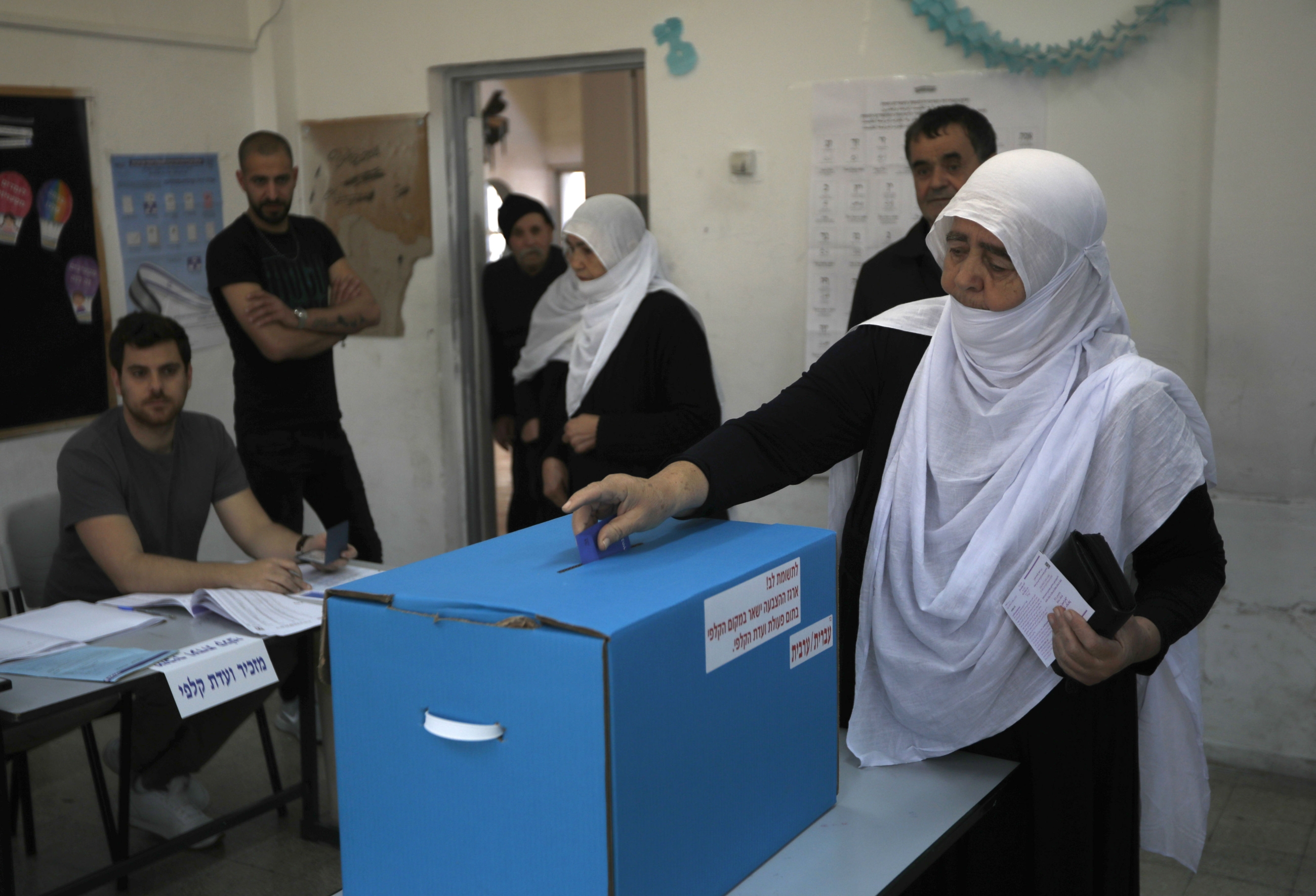
Israelis have begun voting in an election that could hand conservative Prime Minister Benjamin Netanyahu a record fifth term or see him dethroned by Benny Gantz, a former general who has pledged clean government and social cohesion.
Polling stations opened at 7am (04:00 GMT) across the country on Tuesday and close at 10pm (1900 GMT).
New MEE newsletter: Jerusalem Dispatch
Sign up to get the latest insights and analysis on Israel-Palestine, alongside Turkey Unpacked and other MEE newsletters
No party has ever won an outright majority in the 120-seat parliament, meaning days or even weeks of coalition negotiations will likely lie ahead.
After the election Israel's president, Reuven Rivlin, will consult the leaders of every party represented in the Knesset and select the person he believes has the best chance of forming a government.
Opinion polls have given Netanyahu's Likud and Gantz's Blue and White a similar number of seats in the 120-seat parliament, with both far short of an outright majority.
If polling trends hold, Netanyahu would be best placed to build a coalition thanks to smaller right-wing parties allied to him.
But there have been repeated warnings about opinion polls' unreliability in the past.
Corruption investigations
Netanyahu's hope of overtaking Israel's founding father, David Ben-Gurion, as longest-serving premier in July has been dented by a looming fraud indictment. He denies any wrongdoing.
Netanyahu has rallied a rightist camp hardened against the Palestinians and played up Israeli foreign policy boons that are the fruit of his ties with the Trump administration.
How do Israeli elections work?
+ Show - HideIsraelis will head to the polls on 9 April to elect candidates to its 120-seat parliament, the Knesset. It will be the second election in just four years, after under-pressure Prime Minister Benjamin Netanyahu called early polls.
Voters will vote for parties, not individual candidates; the more votes a party gets, the more Knesset seats. Click here for profiles of the parties and the candidates.
Since no single party has ever captured more than the 60-seat threshold to form a government on its own, coalitions are an established part of political life. This makes Israel’s election a free for all, with some 47 parties competing this year alone. Parties must receive at least 3.25 percent of the popular vote in order to gain a seat in the Knesset.
After the election, Israel’s president will consult with party leaders to determine which coalition is most likely to form a stable government. The president will also nominate the prime minister, who is usually the head of the party that won the most seats.
At the same time, he has used Trump-like tactics, calling the corruption investigations a "witch hunt" and denouncing journalists covering them.
Critics say his populist rhetoric amounts to the demonisation of Palestinian citizens of Israel and others.
On Saturday, the 69-year-old Likud party leader pledged to annex settlements in the occupied West Bank if he wins another term in office in a last-minute appeal to right-wing voters.
Settlements built on land occupied by Israel in the 1967 Middle East war are illegal under international law.
'Bibi fatigue'
Critics warn of "Bibi fatigue" and argue that the parliamentary election should bring fresh faces to high office.
Stalking Netanyahu in the opinion polls has been Gantz, a former chief of the armed forces and centrist political novice.
Buttressed by two other former generals at the top of his Blue and White party, Gantz, 59, has sought to push back against Netanyahu's self-styled image as unrivalled in national security.
Gantz called Netanyahu's annexation pledge an "irresponsible" bid for right-wing votes.
"Israel needs to choose a direction of unification, connection and hope -- or of extremity," Gantz told Israel's army radio on Monday.
Voting at a polling station in Rosh Ha'ayin near Tel Aviv, gynaecologist Yaron Zalel, 64, said he supported Gantz.
"I'm feeling excited because I think we are going into a new era, and we are going to change the government today," he added.
"Netanyahu did a lot of great things for Israel, really, a lot of great things. But he is 13 years in power and enough is enough."
"He has had enough, he did enough. Now when he feels his earth, the political earth, is shaking, he is destroying everything.
"This has to be stopped. I am here for my kids and the next generations. There is no one who can’t be replaced."
'I voted for... a change in the racism that exists here'
Backing Netanyahu was another voter at the same polling station, Avi Gur, 65, a lecturer at Ariel University in a settlement in the Israeli-occupied West Bank.
"Very excited, very excited. I hope that rightism will win," he said, adding that the Likud leader was "the best prime minister there has ever been" in Israel.
"We are leading in high tech, we are leading in security, we are leading in the economy now. That’s good."
In Jerusalem, librarian Ronza Barakat, a librarian belonging to Israel's Arab minority, said she backed the left-wing Meretz party.
"I voted for them hoping for change, a change in the racism that exists here," she said. "We live together in a place of peace, why should hate exist between people?"
With little policy daylight between the two main candidates on issues such as Iran and relations with the Palestinians, much of the voting will be guided by judgements on character and personality.
'Netanyahu is not the messiah'
In vitriolic campaigns waged largely over social media rather than in town squares or street corners, Netanyahu and Gantz have traded escalating accusations of corruption, of fostering bigotry and even of conspiring with Israel's adversaries.
Netanyahu casts himself as the victim of media bias and judicial overreach.
"This is a choice between a strong right-wing government under Netanyahu or a weak leftist government under Gantz," his Likud party said in a pre-election statement.
Gantz casts himself as a salve for Israel's religiously and ethnically riven society and its ties with liberal Jews abroad.
"Netanyahu is not the messiah, nor an irreplaceable legend," Gantz told Reuters in the run-up to the election. "The people of Israel long for something else."
'There is really no left, left in Israel'
But the distinctions between the leading parties in Israel were not as vivid as they had been in past decades, said Nabil Shaath, a veteran adviser to Palestinian Authority President Mahmoud Abbas.
"There were times when elections were important, because there was really more than one camp in Israel, there was a left and there was a right," he said on Monday.
"But now, what are you talking about? It's the right, and then further to the right and then the extreme right and then further to the extreme right, there is really no left, left in Israel."
Both Netanyahu and Gantz have publicly ruled out a future alliance in a "national unity" coalition, but some analysts predict a rethink, especially if the candidates agree to tackle together a widely expected US plan for Middle East peace.
That plan's sponsor, President Donald Trump, told Republican Jewish supporters on Saturday: "I think it's going to be close... Two good people."
If he does triumph, Netanyahu faces the prospect of becoming the first sitting prime minister to be indicted.
The attorney general has announced he intends to indict Netanyahu for bribery, fraud and breach of trust pending an upcoming hearing.
He is not required to step down if indicted, only if convicted with all appeals exhausted.
Middle East Eye delivers independent and unrivalled coverage and analysis of the Middle East, North Africa and beyond. To learn more about republishing this content and the associated fees, please fill out this form. More about MEE can be found here.



